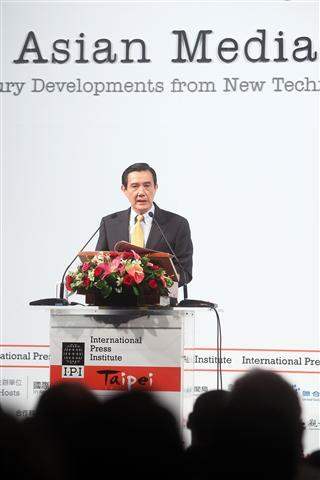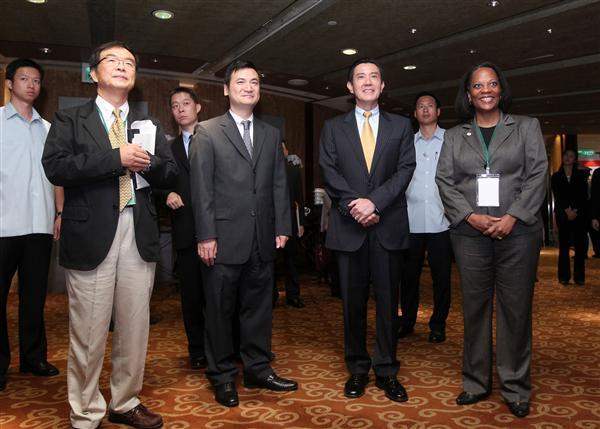News & activities
 News releases
News releases
Chairman Eberle,
Director McKenzie,
Chairman Wang,
media representatives,
distinguished guests,
ladies and gentlemen,
Good morning !
I’m delighted to have the honor to take part in the opening ceremony of the IPI World Congress 2011. First, on behalf of the government and people of the Republic of China (Taiwan), I would like to extend a warm welcome to the media leaders and outstanding journalists who have traveled from all over the world to participate in this gathering.
This assembly of over 300 media representatives from 47 countries not only is a major event in the global journalism community; it is also an occasion of special significance to us because we’re celebrating our Centennial this year.
Since its founding, the IPI has been a staunch champion of press freedom. In addition to promoting democracy around the world, it has fought tirelessly to defend the rights and improve the working conditions of news media professionals. IPI members are actually warriors for human dignity who do not shrink from addressing sensitive or controversial issues. They courageously criticize those who wield power, and they come to the aid of media colleagues who are subject to violence and intimidation.
The IPI stresses the imperative necessity of press freedom for the advancement of democracy—a conviction I personally share. Freedom of the press is a fundamental human right guaranteed by the Constitution of the Republic of China and is a cornerstone of our democratic system, which I have striven to uphold.
The IPI has a long history of interaction with the ROC. In May 1970 a delegation of over 200 IPI members was received by the late President Chiang Kai-shek. At that time Taiwan was still under martial law. Almost 30 years later, in May 1999, the IPI held its World Congress and 48th General Assembly here in Taipei. As Taipei mayor at the time, I was very honored to host a welcome banquet for the 300-plus participating IPI members from more than 40 countries.
Now, 12 years later, I feel it is particularly meaningful that the IPI has once again chosen to hold its annual meeting in Taipei. Because Taiwan already had its second turn-over of political power three years ago, I take it as an affirmation of our nation’s press freedom and democracy.
On several occasions in recent years, the IPI has expressed concern over the right of Taiwan journalists to gather news at international forums. In March 2008, it issued a statement on its website supporting our journalists’ right to cover the World Health Assembly. And in its annual World Press Freedom Review of 2007 and 2009, the IPI expressed its broad support of Taiwan journalists’ newsgathering rights.
In your organization’s 2009 review, moreover, the ROC was assessed as having a much freer press environment than most other Asian countries. In that year’s review, the IPI also called on the international community to give serious attention to our appeals for the right to participate in United Nations activities and the right of our journalists to cover international events.
So on behalf of my country, I would like to take this opportunity to express our great appreciation to the IPI for such unwavering support for press freedom.
For many years, Taiwan was under martial law. After it was lifted in 1987, democratic reforms proceeded at a very fast pace. Reforms undertaken include repeal of bans on the formation of new newspapers and new political parties, the opening of all legislative seats for election by the people of Taiwan, and the holding of direct presidential elections beginning in 1996, which helped make possible the transfer of power between political parties.
Since 1988, more than 2,000 new newspaper licenses have been issued, and there no longer exist any taboos with regard to reporting on political affairs. Further, final realization of the constitutionally guaranteed freedom of publication and freedom of speech came in 1999, when our Legislature repealed the Publication Act. That was the year IPI held its congress in Taiwan. I don’t think it’s a coincidence.
For many years, Taiwan has been listed as a “free country” in the Freedom in the World survey conducted by US-based Freedom House, while leaders the world over have characterized Taiwan as a beacon of freedom and democracy. Notably among leaders, George Bush Jr. of the United States, three years ago when I was elected, he sent us a paragraph saying that Taiwan is a beacon of democracy for Asia and the world. We have heard that many times before, but not everyone in the past recognized and accepted that. And these remarks really give us encouragement to work toward the advancement of press freedom of this country.
As we celebrate the ROC Centennial, we are mindful that the progress we have made in advancing human dignity is a combination of parallel efforts. Only a free, well-informed people can form a government able to rise to all challenges and create a prosperous and secure environment in which people can pursue their dreams with equal opportunity. Conversely, only success in sustaining such an environment can ensure that freedom flourishes.
That kind of virtuous cycle is what enabled us to take on challenges with confidence and resilience. Since I came into office in 2008, for example, Taiwan has overcome numerous difficulties, first the sky-rocketing oil prices and then the economic downturn caused by the financial tsunami, and then the H1N1 influenza pandemic.
On the economic front in the last three years, we have been able to vigorously revive our economy. Last year we achieved 10.88% growth, which was second in Asia and fourth in the world, while the unemployment rate dropped to below 5 percent. As to our economic prospects, the US-based Business Environment Risk Intelligence, in its second report this year, awarded Taiwan the third-highest Profit Opportunity Recommendation in the world; only Singapore and Switzerland were rated higher. In the meantime, Switzerland’s International Institute for Management Development, based in Lausanne, ranks Taiwan at No. 6 in its 2011 World Competitiveness Year Book.
On other fronts, we have undertaken major reconstructions and streamlining of our central and local governments. We will downsize our central government from 37 ministries to 29 beginning next year, and we will also encourage mergers of local governments in order to increase efficiency.
We have also improved the living conditions of the disadvantaged. We have increased the number of people who receive government aid from 260,000 to 850,000 and we have also greatly improved our relations with mainland China and restored high-level mutual trust with United States and Japan. Due to our efforts, we were able to increase the number of countries and territories which have given us visa-free status. When I took office three years ago, the number was 54, while this year the number is up to 117, more than double the figure when I first came to the Office.
I have always wanted the Republic of China to play a different role in the international community. The first one is a peace-maker. This is why I vigorously and seriously pursue reconciliation with mainland China. Second, I want to play the role of provider of humanitarian assistance. We did this in Haiti and then we did this in Japan nearly five months ago. I think many of our friends in the region feel that we have really tried our best to help our friends whether they’re developing countries or developed countries. I remember calling our rescue team who went to Haiti 12 hours after the earthquake took place. The team leader received my call, and I could feel that he was thrilled by their success. He told me, “Mr. President, we just rescued a French guy from the debris. He is a UN staff member.” He had good reason to be thrilled because that was the first time for our rescue team sent abroad to get somebody out alive. Well, in the next couple of days they did that again, they rescued another one, and together, with other teams, they rescued seven people.
I understand our media friends pay close attention to relations across the Taiwan Strait. After six rounds of negotiations in the last three years, we were able to conclude 15 agreements with the Chinese mainland, covering such matters as direct navigation, flight, food, safety, a supervisory mechanism for banks and other financial institutions, and joint efforts to combat crime. And most importantly, we concluded an economic framework agreement, “ECFA” for short, last year, which opens up the opportunity for Taiwan to get involved in regional economic integration. From the year 2000 to 2010, in Asia there were 58 free trade agreements signed. Taiwan had nothing. And the only other country which didn’t do this outside Taiwan was North Korea. This is obviously unfair for a country having a bilateral trade of over US$416 billion. So we took action, and we approached mainland China first, because it is our largest trading partner, and after we completed an agreement with them, the benefit didn’t come only from the lowering of tariffs, but also from other countries’ actions. Now we are able to negotiate an Economic Cooperation Agreement with Singapore, and three days ago, Japan signed an Investment Protection and Promotion Pact with Taiwan. That was the first pact of this kind reached with Japan since we severed diplomatic relations with each other 38 years ago. This is in a way monumental in Taiwan’s history. This obviously is attributable to the situation we created... to the atmosphere we created. Leaders in other countries believe if Beijing is willing to improve relations with Taipei, why couldn’t they? This logic has obviously helped us to expand our international participation. And this is what I call a virtuous cycle. We improve relations with the mainland, and together we do the same with other members of the international community. And I believe by doing this we will be able not only to become a peace maker, and a provider of humanitarian aid, but also a promoter of cultural exchange and other benefits as a result of security and peace.
Well, I believe all of you have already noticed that Taiwan was aptly described by Portuguese sailors in the 17th century. They called us Ilha Formosa, which means “beautiful island.” I am not sure if you have enough time to travel outside of Taipei, but I certainly encourage you to do that to enjoy the multi-dimensional heritage of this country, particularly in this centennial year. And I certainly would like to remind you, last but not least, you should really enjoy the good food of this country by going to our night markets. And in addition to that, during your stay, please do as much shopping as possible to help spur the recovery of our economy.
Thank you very much for joining us! Thank you.




